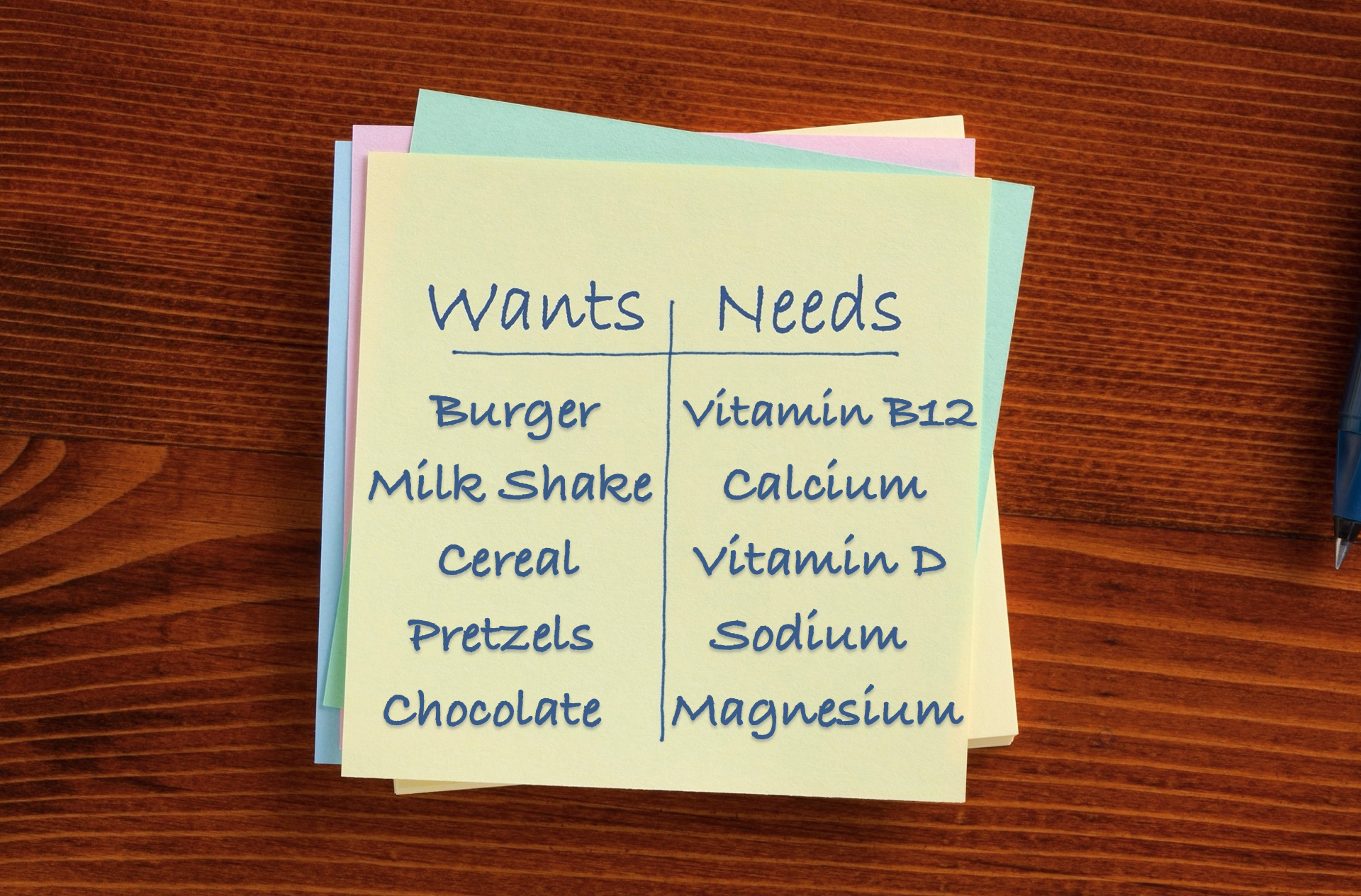
Caving to Cravings
There are two types of cravings. Your body craves things that it needs as well as things that it wants. The problem is that it’s sometimes difficult to know which is which. Do I crave a pint of ice cream because natural milk sugars will offer me a sorely needed quick boost in energy…or is it just because I’ve developed bad habits surrounding excessive amounts of sugar and fat?
There’s another possible answer. I could have a calcium deficiency that I’m not consciously aware of, but my brain certainly is. Our brains would give any calorimeter a run for its money. It has an amazing ability to know the composition of vitamins, minerals, and nutritional value in what we eat. This is an essential tool to our survival but can cause issues when our diet is restricted to certain foods based on caloric value.
Craving a cheeseburger for lunch? You may just have a Vitamin B12 deficiency. The same B12 that your brain knows is found in abundance in beef and cheese. So, being deficient in something that weighs a couple of grams may lead to you an uncontrollable urge to order the double cheeseburger instead of the chicken caesar salad. And no one in their right mind would eat a burger without fries. And you’ve gotta have a nice pilsner or two to wash that down. So you ended up eating well over 2 pounds of food just to get a couple of grams of Vitamin B12 that you were missing. All of this could have been avoided if you had been taking a good multivitamin, which would’ve satisfied all of your vitamin and mineral needs.
Stop Drinking So Much Water
There are lots of myths and bad advice that have been circulating for years related to adequate hydration. The idea of drinking your weight in ounces of water every day is a ridiculously horrible idea. Does someone that weighs 180 pounds really need to drink 9, 20 ounce bottles of water to be properly hydrated? Of course not.
Your body is made up of 60% liquid...not 60% water. Blood is your number one fluid in the body and that blood is comprised of many vitamins, and minerals. Of those minerals, electrolytes are the ones that help to hydrate the body (they also help to regulate nerve and muscle function, balance blood acidity, and rebuild damaged tissue). So yeah, they're pretty important. What you're actually doing when you drink massive amounts of water is flushing those electrolytes from your body.
If you'd like to drink massive amounts of water, go right ahead. Unless it's in the form of coffee, milk, beer or wine, I would strongly recommend adding electrolytes. Adding electrolytes (powder, liquid or tablets) to your water will ensure that you are replenishing all that is being flushed out of your system.
How do I make sure I'm not getting dehydrated? I strongly recommend using a body composition scale if you're following the Fat Math Formula. These scales will tell you what your percentage of liquid is in your body. I would also recommend weighing yourself before and after exercising. Simply drink 16 ounces of water (with electrolytes) for ever pound that you've lost during exercise in order to ensure you remain adequately hydrated.
The list below shows a handful of vitamins and minerals that I would suggest getting tested for. I've also listed several foods next to each that are highest in these vitamins and minerals.
Vitamins
Vitamin A - dairy products, liver, fish, fortified cereals, carrots, broccoli, cantaloupe, and squash
Vitamin C - broccoli, Brussels sprouts, cauliflower, peppers, spinach, cabbage, turnip greens, potatoes, tomatoes, winter squash
Vitamin D - salmon, sardines, herring and mackerel, red meat, liver, egg yolks, breakfast cereals
Vitamin E - vegetable oils, almonds, peanuts, hazelnuts, sunflower seeds, spinach, broccoli
Vitamin K - kale, spinach, turnip greens, collards, Swiss chard, mustard greens, parsley, romaine, broccoli, cauliflower, cabbage, fish, liver, eggs
Vitamin B1 (thiamine) - fortified breakfast cereals, pork, fish, beans, lentils, green peas, enriched cereals, breads, noodles, rice, sunflower seeds, yogurt
Vitamin B2 (riboflavin) - eggs, organ meats, lean meats, milk, green vegetables, grains, cereals
Vitamin B3 (niacin) - liver, chicken breast, tuna, turkey, salmon, anchovies, pork, ground beef
Vitamin B6 - pork, chicken, turkey, fish, peanuts, wheatgerm, oats, bananas
Vitamin B12 - beef, liver, chicken, trout, salmon, tuna, clams, cereal, low-fat milk, yogurt, cheese, eggs
Pantothenic acid - beef, poultry, seafood, organ meats, eggs, milk, shiitakes mushrooms, avocados, potatoes, broccoli, brown rice, oats, peanuts
Biotin - legumes, egg yolks, organ meats, nuts, seeds, mushrooms, avocados, sweet potatoes
Folate - turnip greens, spinach, romaine lettuce, asparagus, Brussels sprouts, broccoli, beans, peanuts, sunflower seeds, liver, seafood
Minerals
Calcium - milk, cheese, curly kale, okra, bread made with fortified flour
Copper - oysters, dark chocolate, shiitake mushrooms, nuts, seeds, lobster
Iodine - seaweed, fish, seafood, eggs
Iron - shellfish, spinach, liver, organ meats, legumes, red meat, pumpkin seeds, quinoa, turkey
Magnesium - greens, nuts, seeds, dry beans, whole grains, wheat germ, wheat, oat bran
Manganese - whole grains, clams, oysters, mussels, nuts, soybeans, rice, coffee, tea, black pepper
Zinc - oysters, red meat, poultry, beans, nuts, crab, lobster, whole grains, fortified breakfast cereals
Electrolytes
Sodium - shrimp, soup, ham, pork rinds, broths, stocks, pretzels, pickles, tomato sauce
Chloride - seaweed, rye, tomatoes, lettuce, celery, olives, table salt
Potassium Bicarbonate - bananas, oranges, cantaloupe, honeydew, apricots, grapefruit, raisins, spinach, broccoli, potatoes, mushrooms
